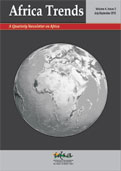Comparing ‘Boko Haram’ and the ‘Islamic State’
Essentially local Islamist extremist groups such as the Boko Haram, which thrive on the domestic social and economic deprivations, seem to be moving towards collaboration with international Islamist groups. This phenomenon is not new, considering the links of Somali groups with the Al-Qaeda.
- Saurabh Mishra |
- October-December 2014 |









